Premier calls for action to relieve poverty
Updated: 2014-01-28 02:16
By He Dan in Beijing and Zhao Yinan in Zhen'an, Shaanxi (China Daily)
|
||||||||
Premier Li Keqiang pledged greater efforts to break the intergeneration poverty curse, during a meeting on poverty alleviation with other senior officials over the weekend.
It is time to adjust the strategy for poverty reduction, Li said at the meeting, which took place on a train traveling from Xi'an to Zhen'an county in Shaanxi province.
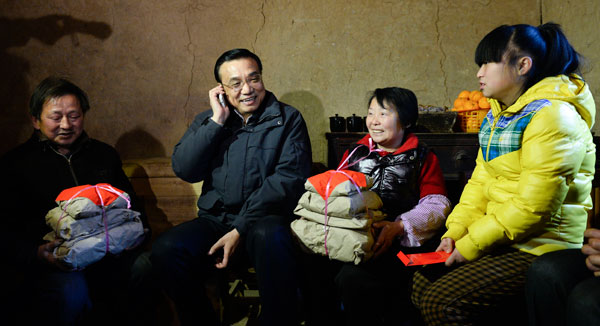 |
|
Premier Li Keqiang talks with the father of Yang Kang, a 12-year-old girl, over the phone during a visit to her home in Xunyang county, Shaanxi province, on Monday. Yang's father works in the city and told the premier he will return home in time for Spring Festival. liu zhen / china news service |
Li told the officials, including central bank governor Zhou Xiaochuan, that though China has lifted more than 600 million people out of poverty since the launch of reform and opening-up, chronic poverty remains in areas with harsh environmental conditions.
He said the government should encourage urbanization, especially the development of small cities and towns, to relocate poor populations.
He also urged local governments to guarantee equal access to public services to those who relocate.
His remarks were made public on Monday.
The premier visited Jinpo, a mountainous village in Ankang city, on Monday morning.
Hua Zelin, a 42-year-old migrant worker who came back to the village for the upcoming Spring Festival holiday, said his best hope is that his oldest son, a senior high school student, is admitted to a decent university and finds a white-collar job in a city.
Hua earns 100 yuan ($16.50) a day working in a brick factory in Xi'an, the provincial capital, to support his family.
"Our generation might have gotten stuck here. But I hope my son is able to leave," he said.
Li also said during the weekend meeting that local governments will enjoy greater autonomy in utilizing funds and initiating measures tailored specifically to tackle the root of the poverty issue.
However, it's urgent that the central government strengthens supervision on "life-saving" money reserved for the needy as a recent audit report revealed serious malpractice in the field.
A total of 86 million yuan earmarked for poverty alleviation was used for other purposes in 19 counties from 2010 to 2012, according to a report released by the National Audit Office in late December.
The auditor's random check also revealed that 17 counties made fraudulent applications and claims for 21.5 million yuan in poverty alleviation funds, Beijing Times reported.
Hong Tianyun, spokesman of the State Council Leading Group Office of Poverty Alleviation and Development, said the State Council has commanded his office and the Ministry of Finance to perfect the management of poverty reduction funds.
The new measures will be released in the near future, he added.
Hong said his office will also work on opening individual accounts for the poverty-stricken population so that money can be directly transferred to their accounts. A national database to record and update the information will also be established.
Hong made the remarks at a news conference on poverty alleviation in rural areas held by the State Council Information Office in Beijing on Monday.
Wang Sangui, a professor at the School of Agricultural Economics and Rural Development at Renmin University of China, told China Daily on Monday that clarifying the roles and responsibilities of different levels of government can help solve the issues with poverty reduction funds.
"Some provincial governments made lists of projects to apply for the central government's poverty reduction funds, but sometimes the projects were unrealistic, so the county government had to use the funds for other purposes," he said.
He urged better participation among county governments and the needy to design programs specific to their needs.
Further, governments above the county level should focus on supervising the flow of funds and evaluating the quality of the programs, Wang added.
Su Guoxia, deputy director of the regulation and policy department of the State Council Leading Group Office of Poverty Alleviation and Development, said at the news conference that China still needs and welcomes international aid for its poverty alleviation work.
She said the country requires international cooperation to study the "difficulties that China encounters in poverty reduction".
Wang from Renmin University of China said China's current government-dominated poverty reduction model has been successful.
"Our government-dominated approach is efficient in carrying out large-scale poverty alleviation programs, but sometimes the real effect is not that satisfactory," he said.
"We don't have experience in terms of mobilizing civil societies to participate in tailoring our poverty reduction policies to poor individuals."
As of 2012, there were about 100 million rural residents living below the poverty line, with an annual per capita income of less than 2,300 yuan.
Contact the writers at hedan@chinadaily.com.cn and zhaoyinan@chinadaily.com.cn
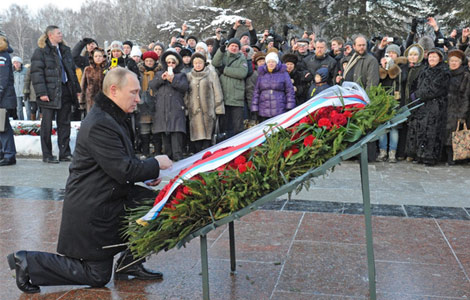
 Putin pays tribute to Siege of Leningrad victims
Putin pays tribute to Siege of Leningrad victims
 Chinese ace Li Na before she was famous
Chinese ace Li Na before she was famous
 Xi visits soldiers on frozen northern border
Xi visits soldiers on frozen northern border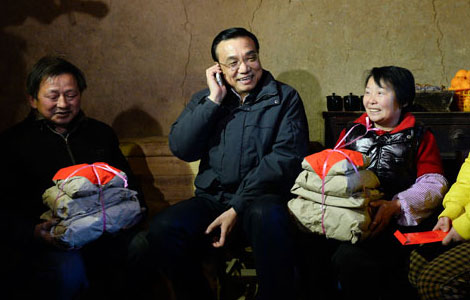
 Premier calls for action to relieve poverty
Premier calls for action to relieve poverty
 Tough Guy event in England
Tough Guy event in England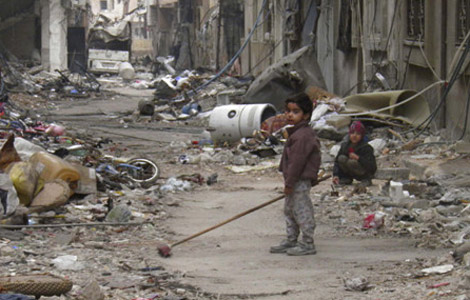
 Syria talks bring offer of exit from siege of Homs
Syria talks bring offer of exit from siege of Homs
 Anti-World Cup protests wane in Sao Paulo
Anti-World Cup protests wane in Sao Paulo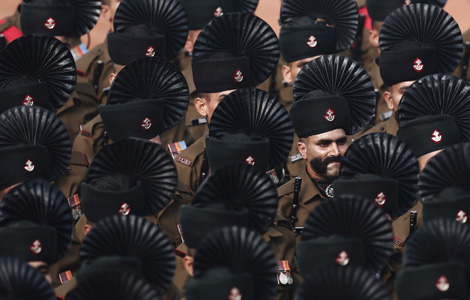
 India celebrates 65th Republic Day
India celebrates 65th Republic Day
Most Viewed
Editor's Picks

|

|

|

|

|

|
Today's Top News
South China Sea archives open in Hainan
Some good US advice for Japan on comfort women
Border control for H7N9 tightens
Int'l hacker got caught in China
Party to reform discipline system
Talent returns to China, but progress slow
300 ill on Royal Caribbean ship
US mall shooting gunman identified
US Weekly

|

|








